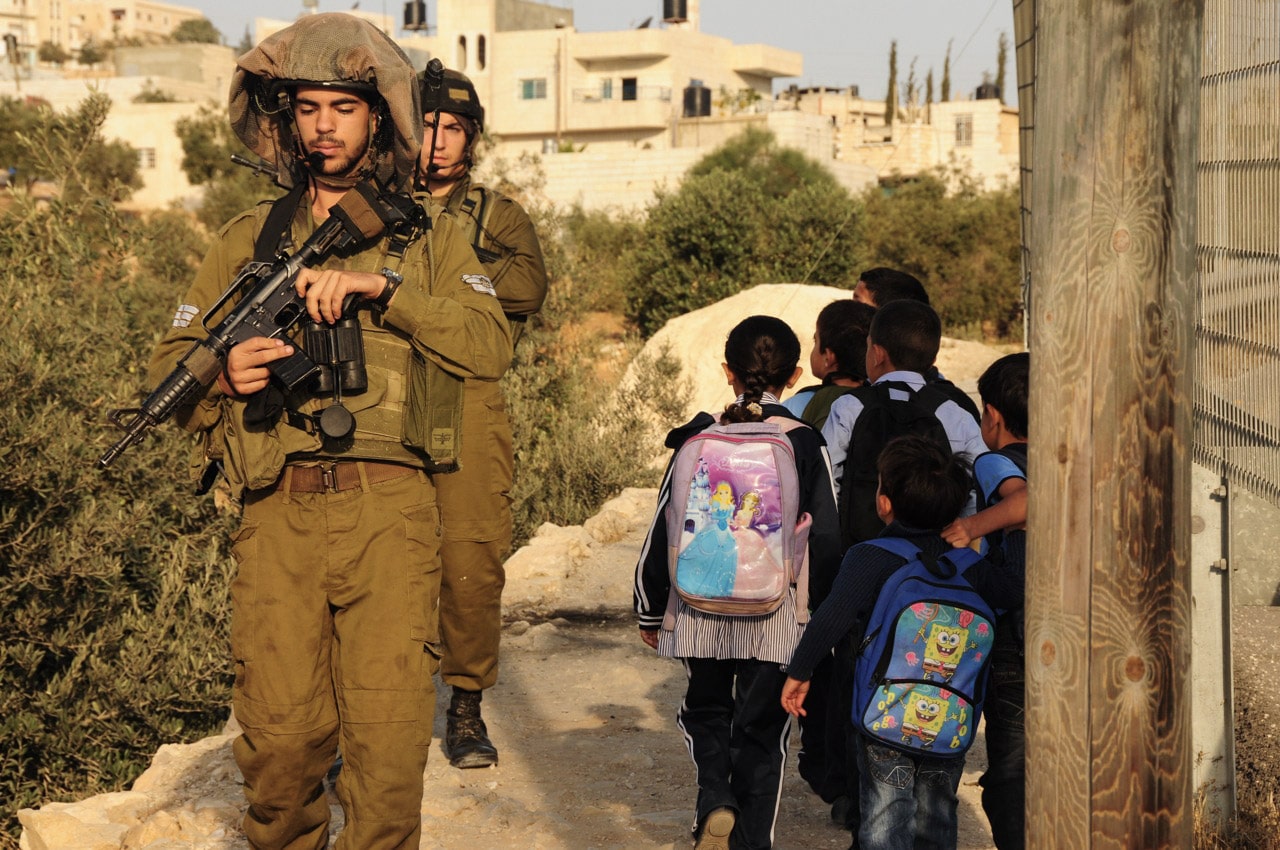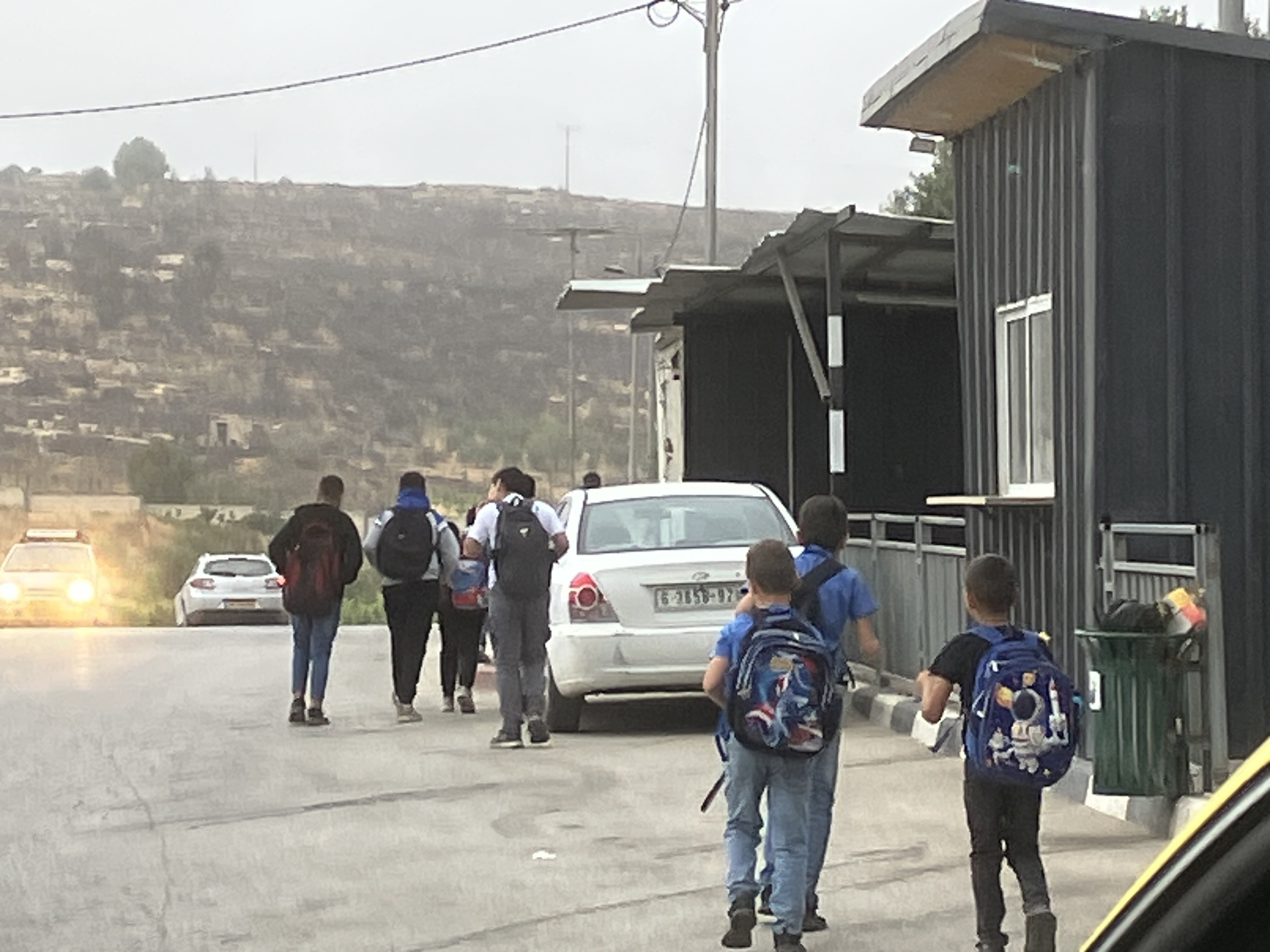‘Schools in Palestine are the primary incubator for building generations and developing minds. There has always been talk about the importance of safe schools, considering them a pillar of secure and stable learning. However, Palestinian schools are deprived of achieving this safety as a result of the practices of the Israeli occupation, its targeting of education, and its ongoing violations against schools, students, and teachers.’

Palestinian children walks past Israeli soldiers on the way to school in Bethlehem
It’s 7.25 on a sunny morning, school starts at 7.45 am. Hundreds of children of all ages are walking to school. Boys are greeting friends, stopping at a small stall on their way in to purchase snacks. Girls are chatting in small groups, holding what looks like homework in their hands. An array of colourful backpacks makes it easy to see the youngest children. We spot an armoured Israeli military vehicle driving slowly past the students. It slows and stops on the road up to the girls’ school. We can see that some of the girls are very anxious about its presence, big sisters reassuring the small girls they are walking with. The boys going to school are also very aware of the presence of the armoured vehicle, pointing and talking.

Palestinian children walking to school
This is a daily occurrence for children in the occupied West Bank. Almost every day, in one or another of the locations we monitored, we saw armoured vehicles driving very slowly back and forth along the roads where school children were passing or soldiers armed with visible automatic weapons standing outside their vehicle on the path of the children on their way to school, or observing the children from a short distance away. Parents repeatedly told us that it makes their children fearful.
From daily photos and videos and visits we know that the children live in communities that regularly experience soldiers shooting live and rubber bullets, sound bombs and tear gas, raiding homes, and taking away family members. In one village, a municipality employee spoke of how distressing it was when his three-year-old son, listening to the sound of armed soldiers raiding their next-door neighbours’ house in the early hours of the morning, pleaded, ‘Papa, please can we go and hit the soldiers.’
On that sunny school morning, two small boys, no more than seven or eight years old, threw stones at the armored car and ran away. We saw the armoured car reverse a short way to the junction and stop. Half a dozen soldiers, armed with the large automatic weapons that all the soldiers carry, got out and stood facing the children walking to school. Then, without warning, they fired canisters of tear gas towards them. Children were running, coughing, their eyes streaming. The soldiers left, but another two armoured vehicles arrived, and more than a dozen armed soldiers filled the area the girls had to pass through. The hundreds of children still trying to get to school past all this immediately reacted with behaviour ranging from anxiety and tears to bravado.
Groups of young children were hanging back. Some, we were later told, wanted to run away and go home; older boys stopped to stand around, watching and talking and risking further escalation. A Ministry of Education representative told us that teenage boys were most at risk of being targeted: they had to close the boy’s school in one village because soldiers were always around the school, and now boys and girls have to both use the girl’s school in separate morning and afternoon sessions.
We spoke with headteachers and teachers who confirmed that military actions significantly adversely impacted their students’ education. They told us that tear gas and sound bombs directed by Israeli soldiers towards children going to and from school and armed military incursions onto school premises are not unusual. One headteacher described the emergency tear gas and military raid mitigation plans she had in place for her primary school students, including cuddly toys in the classroom safe corners.

Palestinian children walking to school
However, these are not the only issues that affect Palestinian students’ ability to access education. The Palestinian Central Bureau of Statistics reports:
‘a sharp decline in the ability of hundreds of thousands of Palestinian children in the West Bank, including East Jerusalem, to access education in 2024.’
This, they say, is due to overlapping obstacles such as the Israeli restrictions on movement, home demolitions, settler violence, and intensive military operations. The report indicates that more than half of the students in the most affected areas experienced harassment or forced delays while going to school, which resulted in around 806,000 students being deprived of safe access to education.
A primary school headteacher explained that:
At night, soldiers raid their homes, and as a result, they are very afraid. Every day, they are stressed. I remember one child who came in with no uniform and said, “the soldiers destroyed my home, and I can’t find my uniform.” Sometimes, they come in vomiting because of fear. They are also very tired when they come into school because of what happens during the nights, and then they don’t study.’
A group of young women, now proudly at university, related their experiences:
‘I was going back home from school with my mother and brother, and near my school, there were soldiers. I was so scared. I had to pass near them and I was really scared. If you do anything, if you run, they’re going to suspect you.’
‘It happens without notice. It’s terrible, with tear gas and sound bombs and everything, they shout at kids and make them afraid. They even enter our schools and shout at the teachers.’
‘It’s not only what happens during the day, it’s also at night. It’s difficult going to school if you have been woken in the night, but we just do it. We have to just go to school.’
The Introduction to the Fifth Educational Guidance Conference highlights the effects on the children:
‘In the light of the grave challenges facing the education sector in Palestine and the violations and crises these students are exposed to that affect their daily lives and leave profound psychological and social impacts, these students find themselves surrounded by feelings of anxiety and constant psychological pressure which negatively affects their academic achievement and psychological and social development.’
On a rare day when there was no military presence on their way to school, we spoke to two brothers aged six and ten.
‘No soldiers, thank God…’
‘It’s not scary because there are no soldiers.’
Take action!
Join the World Council of Churches / Ecumenical Accompaniment Programme in Palestine and Israel in our global advocacy campaign, Stop annexation, end the occupation, running from 21 May to the anniversary of the occupation on 11 June:
-
Sign our urgent letters to elected representatives and faith leaders saying no to the annexation of Palestinian land.
-
Register for the webinar and be a multiplier of these efforts by inviting people to join you in watching it. Accompaniment, solidarity and joint action for justice and peace – June 5 at 6-7pm BST Registration – June 5 Webinar
-
Follow and share the series of feature stories for this campaign on our Facebook and Instagram to learn more about the wide variety of human rights violations taking place under occupation, and how these impact the daily lives of Palestinians.
What does international law say?

